Diary and photograph of John Adams, 1914-1916, Part 5 of 16
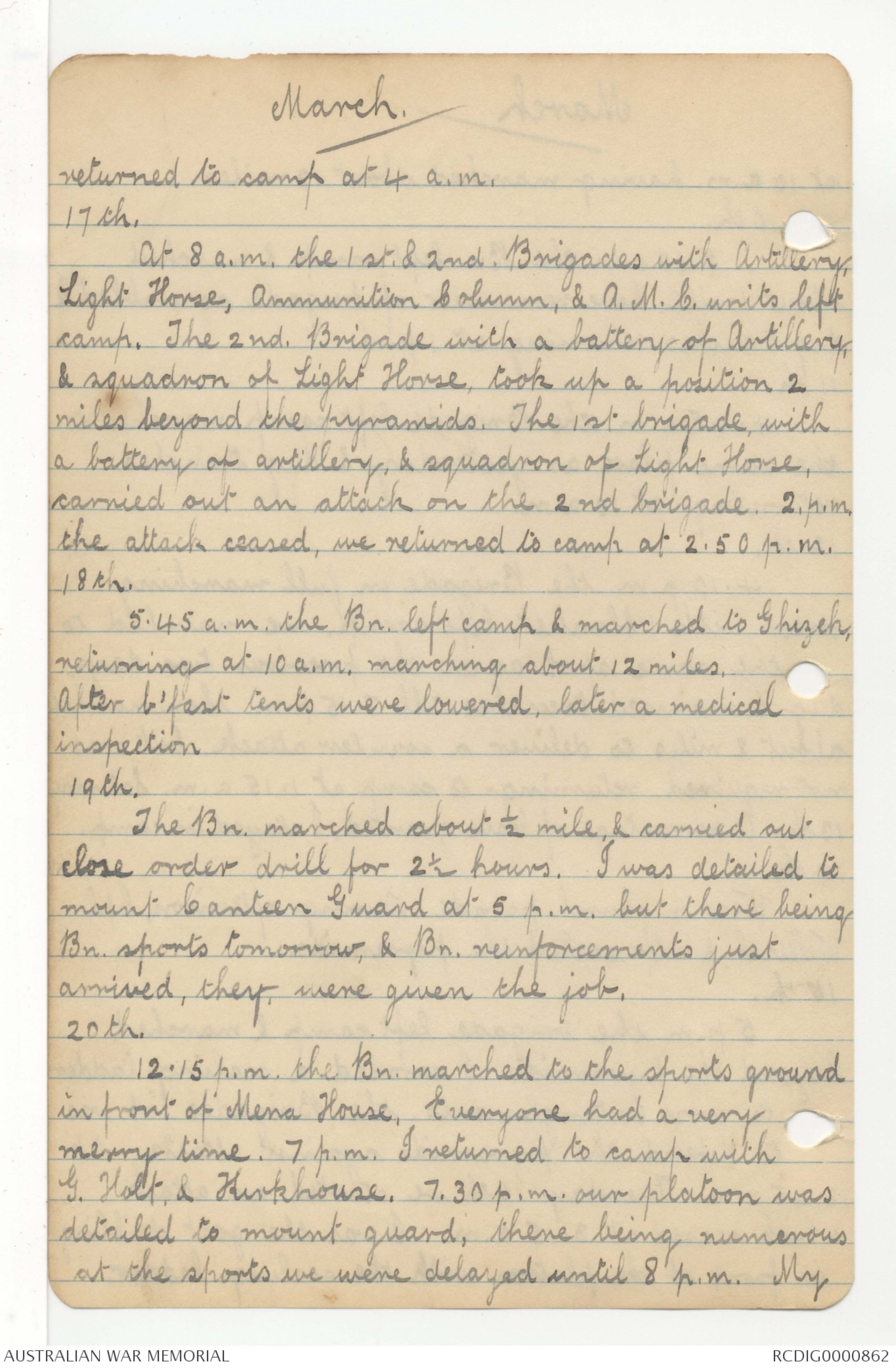
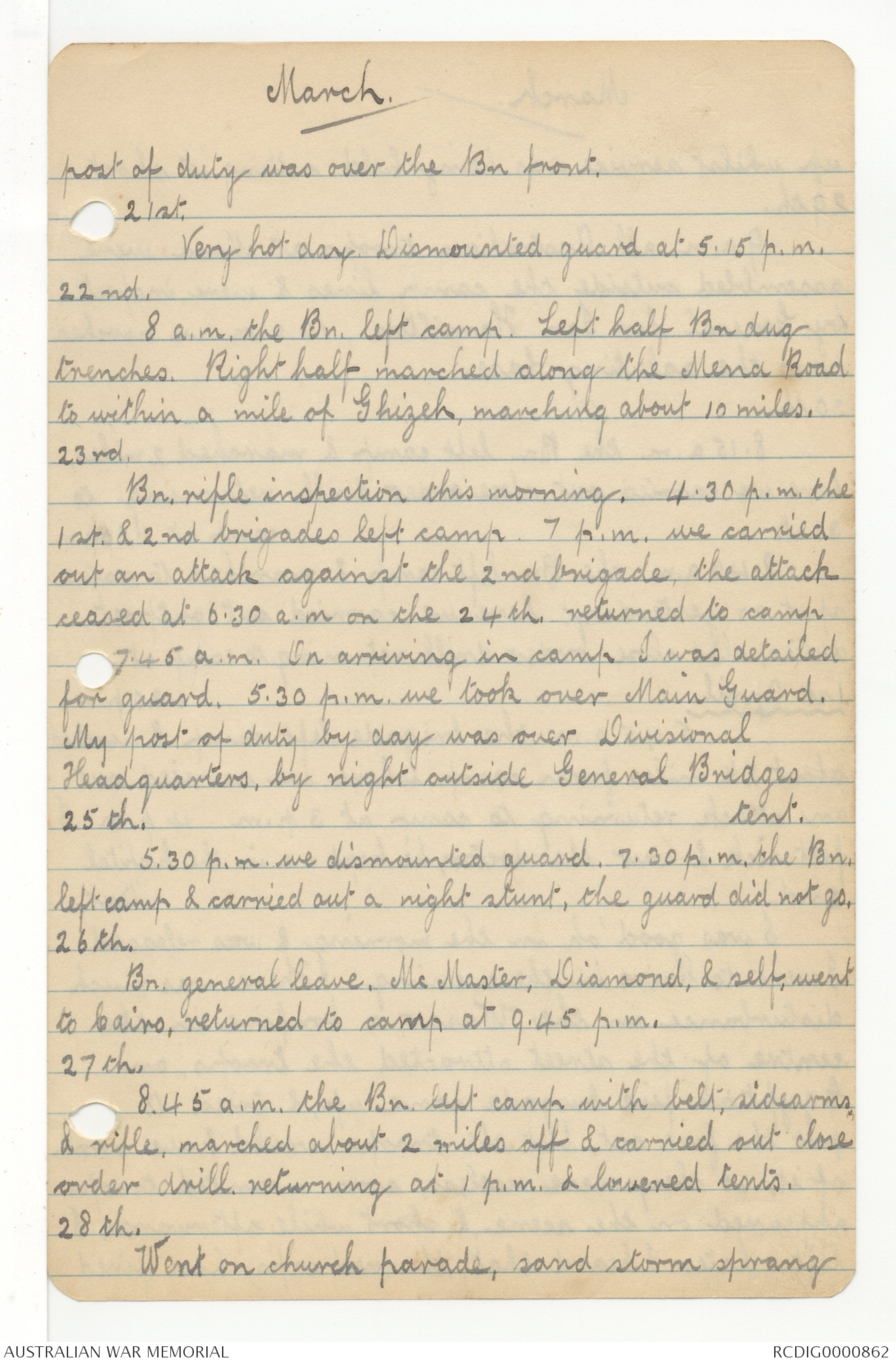
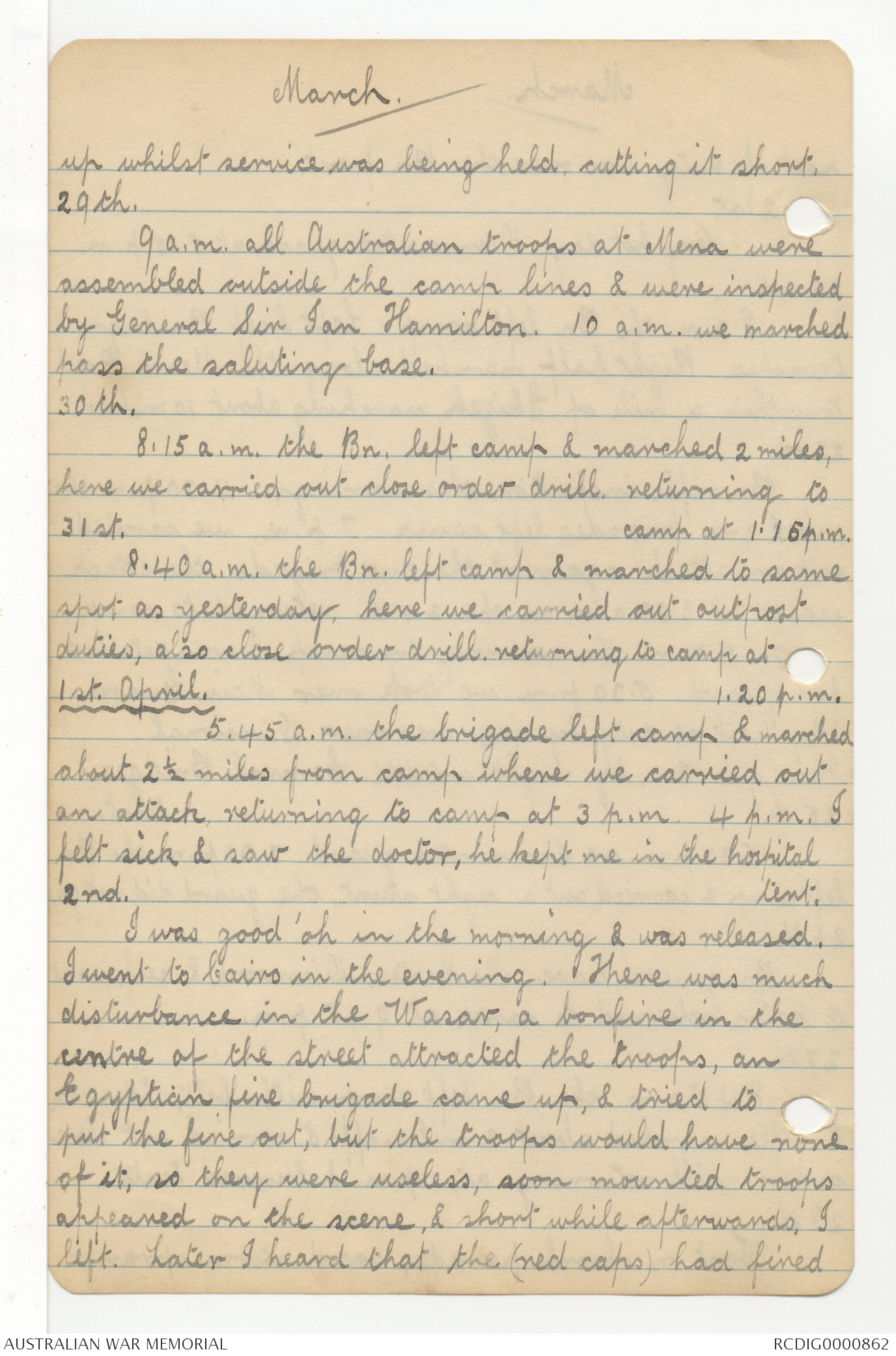
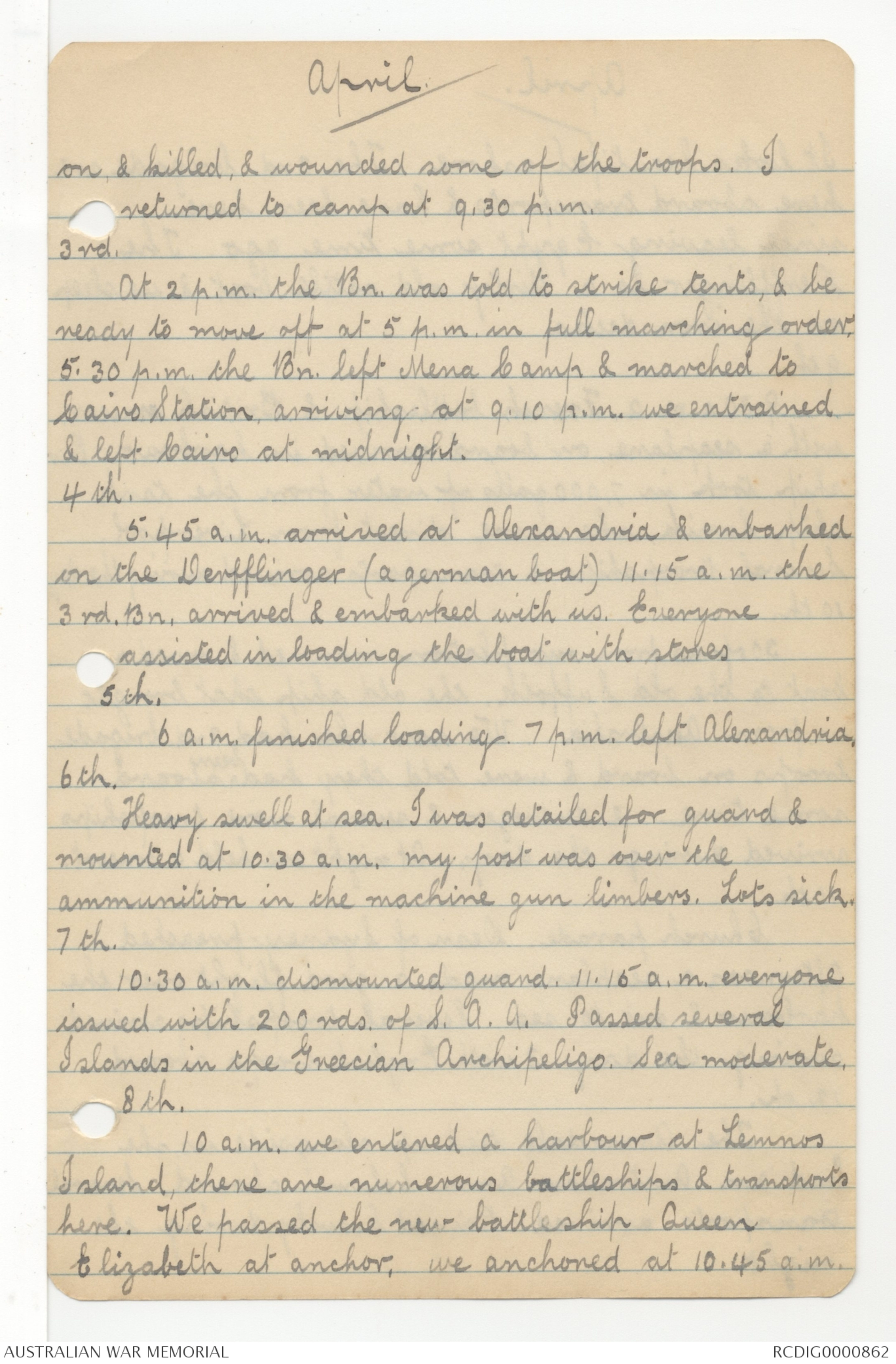
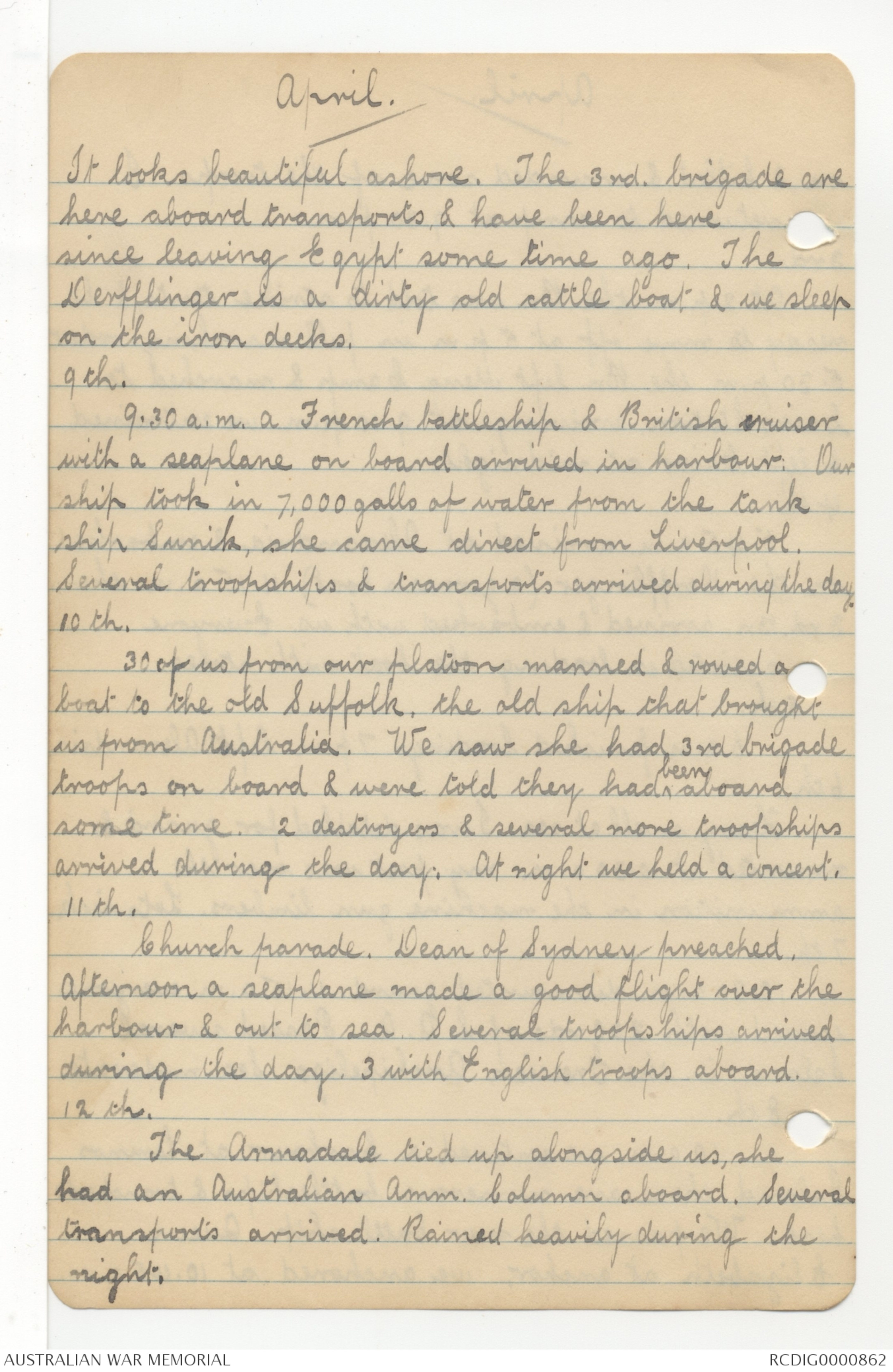
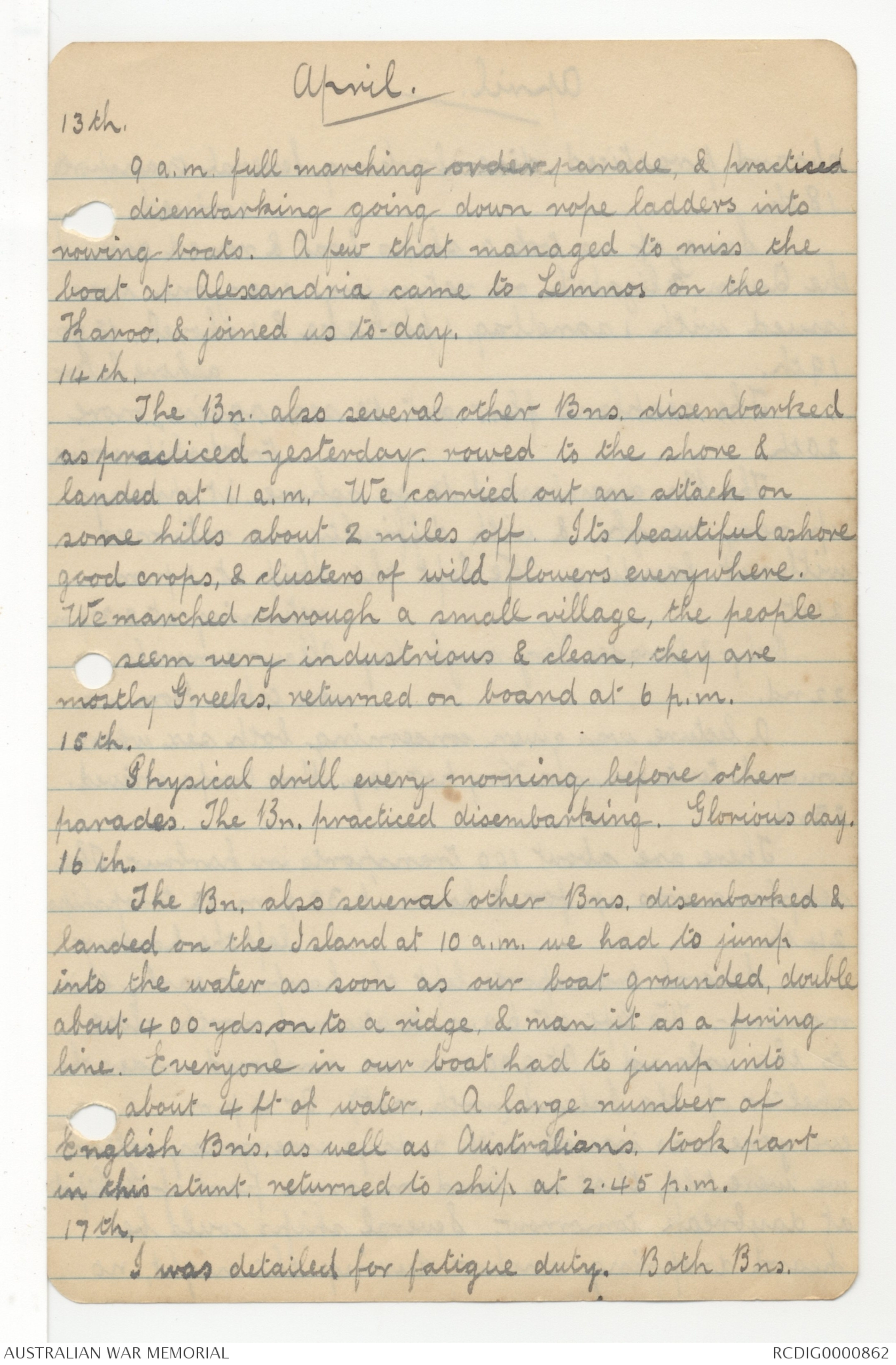
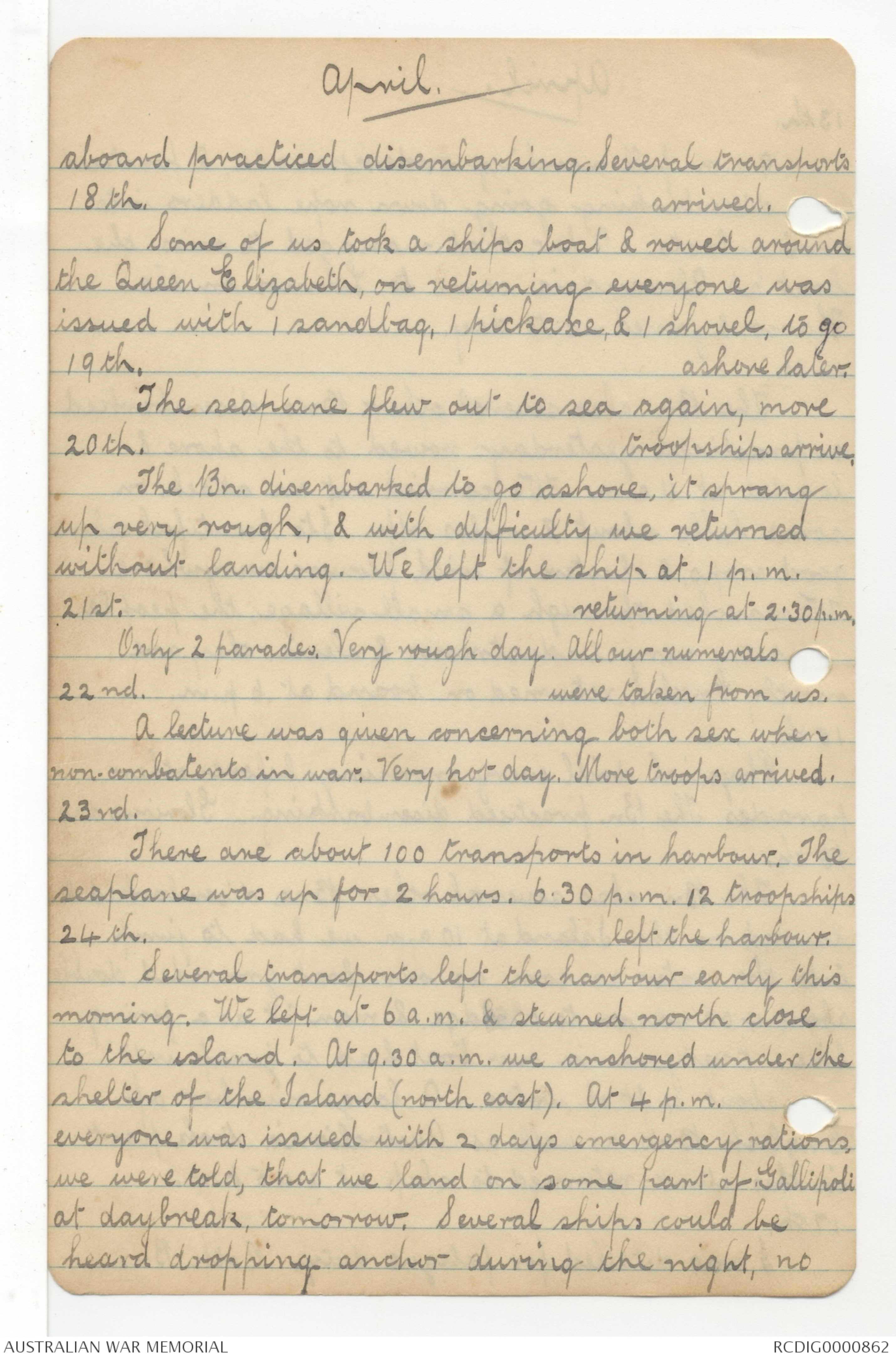
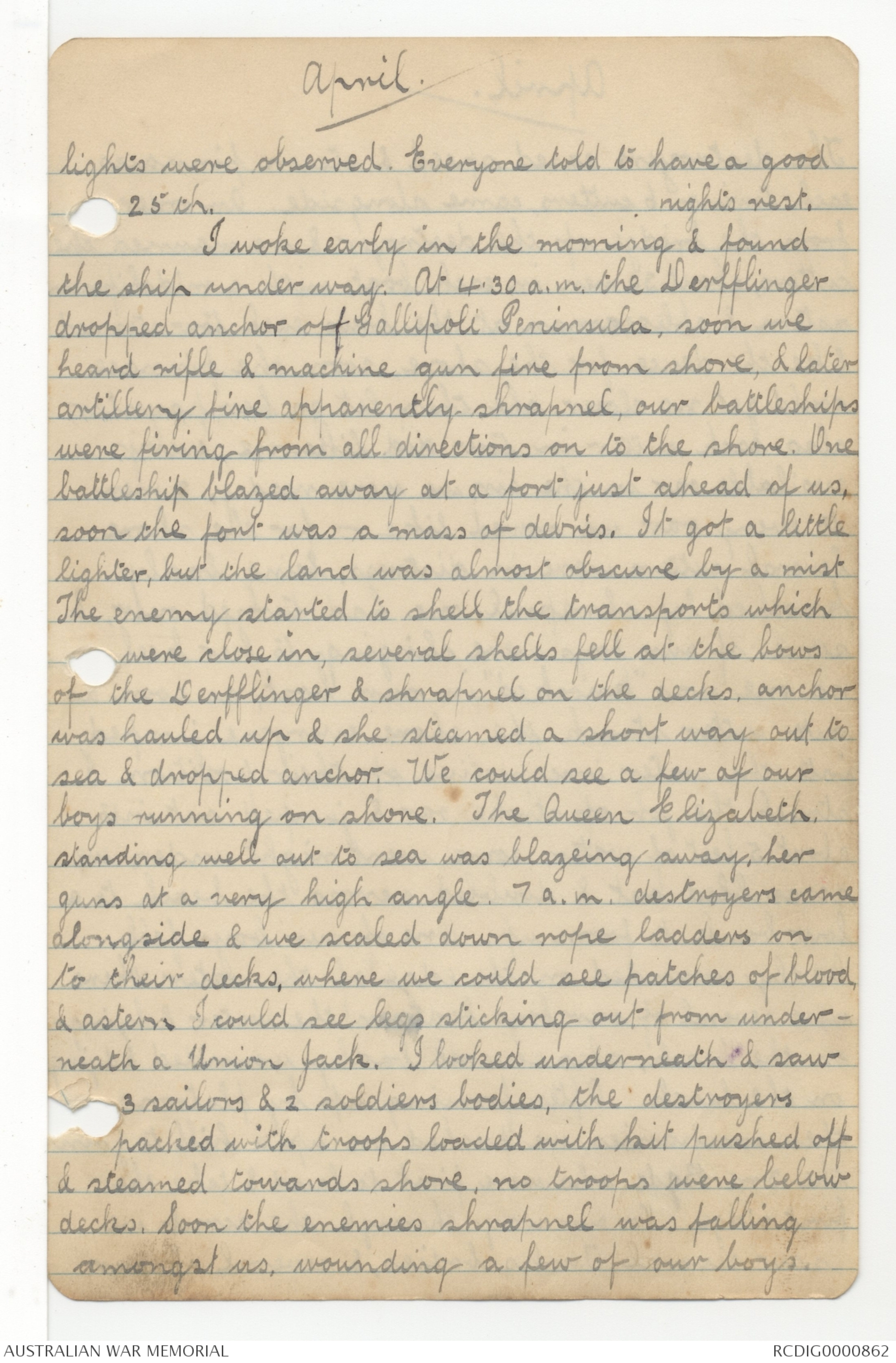
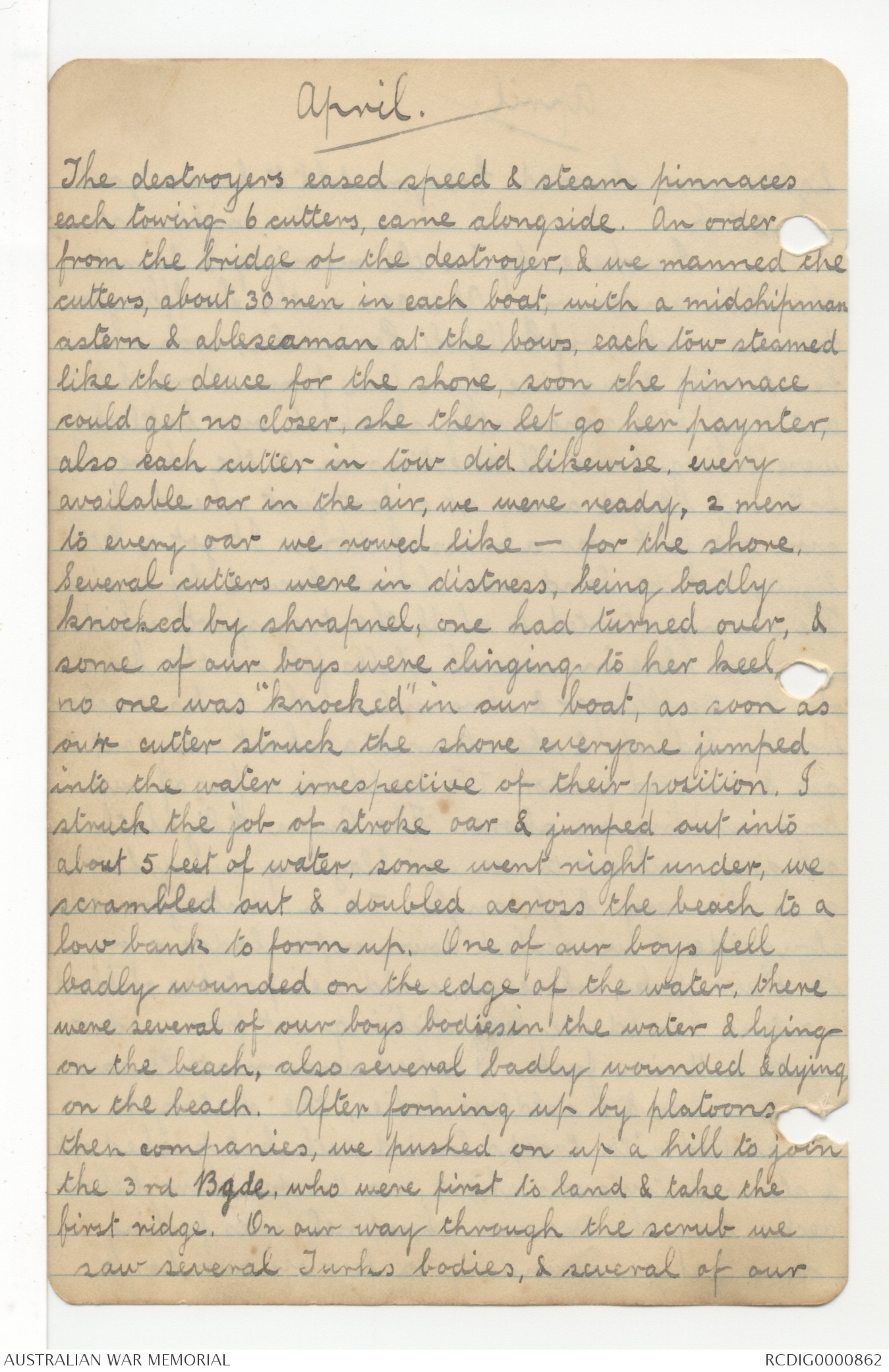
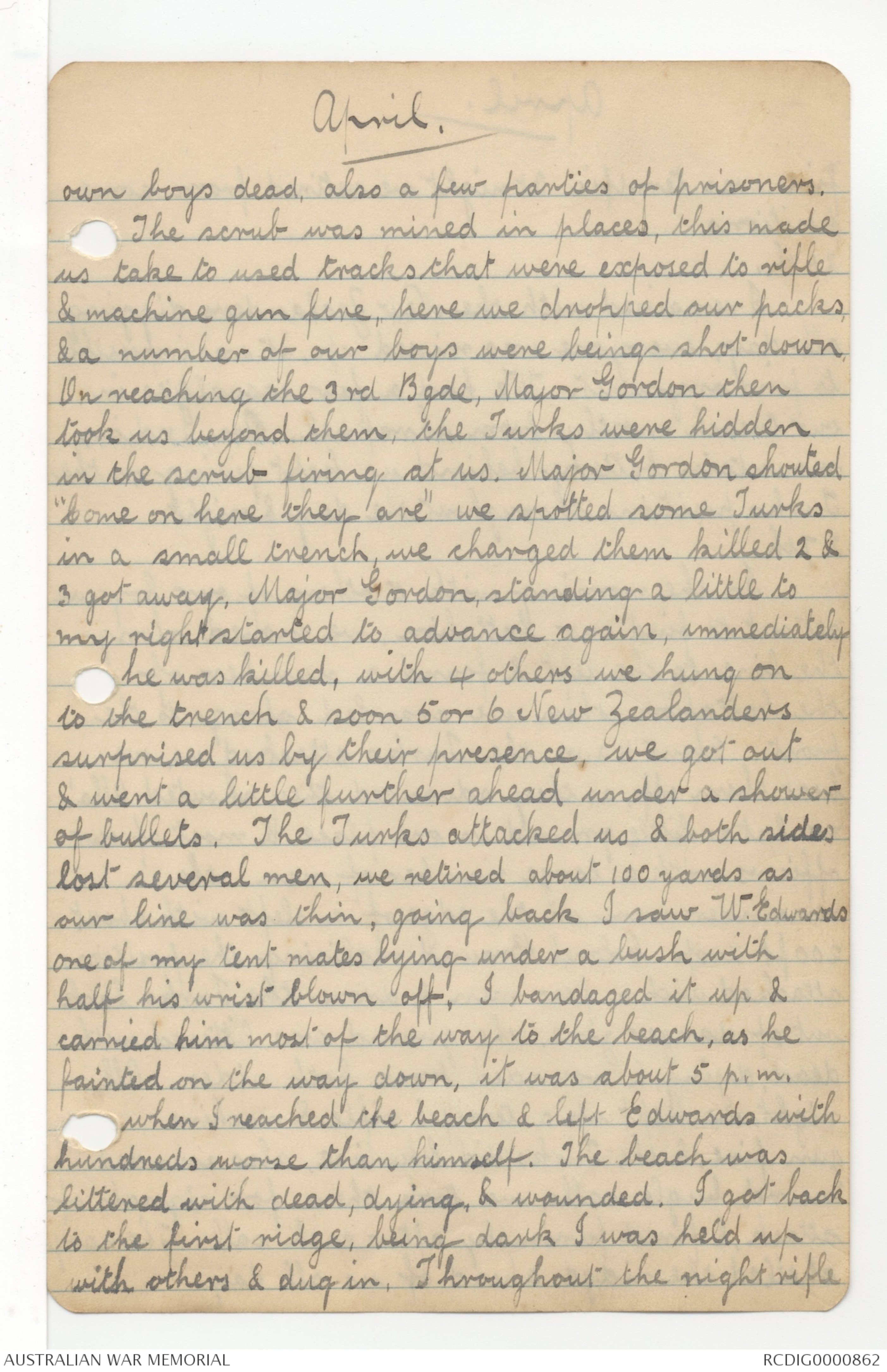
March.
returned to camp at 4 a.m.
17th.
At 8 a.m. the 1st. & 2nd. Brigades with Artillery,
Light Horse, Ammunition Column, & A.M.C. units left
camp. The 2nd. Brigade with a battery of Artillery,
& squadron of Light Horse, took up a position 2
miles beyond the pyramids. The 1st brigade, with
a battery of artillery, & squadron of Light Horse,
carried out an attack on the 2nd brigade. 2.p.m.
the attack ceased, we returned to camp at 2.50 p.m.
18th.
5.45 a.m. the Bn. left camp & marched to Ghizeh,
returning at 10 a.m. marching about 12 miles.
After b'fast tents were lowered, later a medical
inspection
19th.
The Bn. marched about 1/2 mile, & carried out
close order drill for 2 1/2 hours. I was detailed to
mount Canteen Guard at 5 p.m. but there being
Bn. sports tomorrow, & Bn. reinforcements just
arrived, they, were given the job.
20th.
12.15 p.m. the Bn. marched to the sports ground
in front of Mena House. Everyone had a very
merry time. 7 p.m. I returned to camp with
G. Holt, & Kirkhouse. 7.30 p.m. our platoon was
detailed to mount guard, there being numerous
at the sports we were delayed until 8 p.m. My
March.
post of duty was over the Bn. front.
21st.
Very hot day. Dismounted guard at 5.15 p.m.
22nd.
8 a.m. the Bn. left camp. Left half Bn dug
trenches. Right half marched along the Mena Road
to within a mile of Ghizeh, marching about 10 miles.
23rd.
Bn. rifle inspection this morning. 4.30 p.m. the
1st. & 2nd brigades left camp. 7 p.m. we carried
out an attack against the 2nd brigade, the attack
ceased at 6.30 a.m on the 24th. returned to camp
7.45 a.m. On arriving in camp I was detailed
for guard. 5.30 p.m. we took over Main Guard.
My post of duty by day was over Divisional
Headquarters, by night outside General Bridges
tent.
25th.
5.30 p.m. we dismounted guard. 7.30 p.m. the Bn.
left camp & carried out a night stunt, the guard did not go.
26th.
Bn. general leave. McMaster, Diamond, & self, went
to Cairo, returned to camp at 9.45 p.m.
27th.
8.45 a.m. the Bn. left camp with belt, sidearms,
& rifle, marched about 2 miles off & carried out close
order drill. returning at 1 p.m. & lowered tents.
28th.
Went on church parade, sand storm sprang
March.
up whilst service was being held, cutting it short.
29th.
9 a.m. all Australian troops at Mena were
assembled outside the camp lines & were inspected
by General Sir Ian Hamilton. 10 a.m. we marched
pass the saluting base.
30th.
8.15 a.m. the Bn. left camp and marched 2 miles,
here we carried out close order drill. returning to
camp at 1.15 p.m.
31st.
8.40 a.m. the Bn. left camp & marched to same
spot as yesterday, here we carried out outpost
duties, also close order drill. returning to camp at
1.20 p.m.
1st April.
5.45 a.m. the brigade left camp & marched
about 2 1/2 miles from camp where we carried out
an attack, returning to camp at 3 p.m. 4 p.m. I
felt sick & saw the doctor, he kept me in the hospital
tent.
2nd.
I was good 'oh in the morning & was released.
I went to Cairo in the evening. There was much
disturbance in the Wasar, a bonfire in the
centre of the street attracted the troops, an
Egyptian fire brigade came up, & tried to
put the fire out, but the troops would have none
of it, so they were useless, soon mounted troops
appeared on the scene, & short while afterwards, I
left. Later I heard that the (red caps) had fired
April.
on, & killed, & wounded some of the troops. I
returned to camp at 9.30 p.m.
3rd.
At 2 p.m. the Bn. was told to strike tents, & be
ready to move off at 5 p.m. in full marching order.
5.30 p.m. the Bn. left Mena Camp & marched to
Cairo Station, arriving at 9.10 p.m. we entrained
& left Cairo at midnight.
4th.
5.45 a.m. arrived at Alexandria & embarked
on the Derfflinger (a german boat) 11.15 a.m. the
3rd. Bn. arrived & embarked with us. Everyone
assisted in loading the boat with stores
5th.
6 a.m. finished loading. 7 p.m. left Alexandria.
6th.
Heavy swell at sea. I was detailed for guard &
mounted at 10.30 a.m. my post was over the
ammunition in the machine gun limbers. Lots sick.
7th.
10.30 a.m. dismounted guard. 11.15 a.m. everyone
issued with 200 rds. of S. A. A. Passed several
Islands in the Greecian Archipeligo. Sea moderate.
8th.
10 a.m. we entered a harbour at Lemnos
Island, there are numerous battleships & transports
here. We passed the new battleship Queen
Elizabeth at anchor. we anchored at 10.45 a.m.
April.
It looks beautiful ashore. The 3rd. brigade are
here aboard transports, & have been here
since leaving Egypt some time ago. The
Derfflinger is a dirty old cattle boat & we sleep
on the iron decks.
9th.
9.30 a.m. a French battleship & British cruiser
with a seaplane on board arrived in harbour. Our
ship took 7,000 galls of water from the tank
ship Sunik, she came direct from Liverpool.
Several troopships & transports arrived during the day.
10th.
30 of us from our platoon manned & rowed a
boat to the old Suffolk. the old ship that brought
us from Australia. We saw she had 3rd brigade
troops on board & were told they had been aboard
some time. 2 destroyers & several more troopships
arrived during the day. At night we held a concert.
11th.
Church parade. Dean of Sydney preached.
Afternoon a seaplane made a good flight over the
harbour & out to sea. Several troopships arrived
during the day. 3 with English troops aboard.
12th.
The Armadale tied up alongside us, she
had an Australian Amm. Column aboard. Several
transports arrived. Rained heavily during the
night.
April.
13th.
9 a.m. full marching order parade, & practiced
disembarking going down rope ladders into
rowing boats. A few that managed to miss the
boat at Alexandria came to Lemnos on the
Karoo. & joined us to-day.
14th.
The Bn. also several other Bns. disembarked
as practiced yesterday. rowed to the shore &
landed at 11 a.m. We carried out an attack on
some hills about 2 miles off. Its beautiful ashore
good crops, & clusters of wild flowers everywhere.
We marched through a small village, the people
seem very industrious & clean, they are
mostly Greeks. returned on board at 6 p.m.
15th.
Physical drill every morning before other
parades. The Bn. practiced disembarking. Glorious day.
16th.
The Bn. also several other Bns, disembarked &
landed on the Island at 10 a.m. we had to jump
into the water as soon as our boat grounded, double
about 400 yds on to a ridge, & man it as a firing
line. Everyone in our boat had to jump into
about 4 ft of water. A large number of
English Bn's. as well as Australian's, took part
in this stunt. returned to ship at 2.45 p.m.
17th.
I was detailed for fatigue duty. Both Bns.
April.
aboard practiced disembarking. Several transports
arrived.
18th.
Some of us took a ships boat & rowed around
the Queen Elizabeth, on returning everyone was
issued with 1 sandbag, 1 pickaxe, & 1 shovel to go
ashore later.
19th.
The seaplane flew out to sea again, more
troopships arrive.
20th.
The Bn. disembarked to go ashore, it sprang
up very rough, & with difficulty we returned
without landing. We left the ship at 1 p.m.
returning at 2.30 p.m.
21st.
Only 2 parades. Very rough day. All our numerals
were taken from us.
22nd.
A lecture was given concerning both sex when
non-combatents in war. Very hot day. More troops arrived.
23rd.
There are about 100 transports in harbour. The
seaplane was up for 2 hours. 6.30 p.m. 12 troopships
left the harbour.
24th.
Several transports left the harbour early this
morning. We left at 6 a.m. & steamed north close
to the island. At 9.30 a.m. we anchored under the
shelter of the Island (north east). At 4 p.m.
everyone was issued the 2 days emergency rations,
we were told, that we land on some part of Gallipoli
at daybreak tomorrow. Several ships could be
heard dropping anchor during the night, no
April.
lights were observed. Everyone told to have a good
night's rest.
25th.
I woke early in the morning & found
the ship under way. At 4.30 a.m. the Derfflinger
dropped anchor off Gallipoli Peninsula, soon we
heard rifle and machine gun fire from shore, & later
artillery fire apparently shrapnel, our battleships
were firing from all directions on to the shore. One
battleship blazed away at a fort just ahead of us,
soon the fort was a mass of debris. It got a little
lighter, but the land was almost obscure by a mist
The enemy started to shell the transports which
were close in, several shells fell at the bows
of the Derfflinger & shrapnel on the decks. anchor
was hauled up & she steamed a short way out to
sea & dropped anchor. We could see a few of our
boys running on shore. The Queen Elizabeth.
standing well out to sea was blazeing away, her
guns at a very high angle. 7 a.m. destroyers came
alongside & we scaled down rope ladders on
to their decks, where we could see patches of blood,
& astern I could see legs sticking out from underneath
a Union Jack. I looked underneath & saw
3 sailors & 2 soldiers bodies, the destroyers
packed with troops loaded with kit pushed off
& steamed towards shore, no troops were below
decks. Soon the enemies shrapnel was falling
amongst us, wounding a few of our boys.
April.
The destroyers eased speed & steam pinnaces
each towing 6 cutters, came alongside. An order
from the bridge of the destroyer, & we manned the
cutters, about 30 men in each boat, with a midshipman
astern & ableseaman at the bows, each tow steamed
like the deuce for the shore, soon the pinnace
could get no closer, she then let go her paynter,
also each cutter in tow did likewise. every
available oar in the air, we were ready, 2 men
to every oar we rowed like - for the shore.
Several cutters were in distress, being badly
knocked by shrapnel, one had turned over, &
some of our boys were clinging to her keel,
no one was "knocked" in our boat, as soon as
our cutter struck the shore everyone jumped
into the water irrespective of their position. I
struck the job of stroke oar & jumped out into
about 5 feet of water. some went right under, we
scrambled out & doubled across the beach to a
low bank to form up. One of our boys fell
badly wounded on the edge of the water. there
were several of our boys bodies in the water & lying
on the beach, also several badly wounded & dying
on the beach. After forming up by platoons
then companies, we pushed on up a hill to join
the 3rd Bgde, who were first to land & take the
first ridge. On our way through the scrub we
saw several Turks bodies, & several of our
April.
own boys dead, also a few parties of prisoners.
The scrub was mined in places, this made
us take to used tracks that were exposed to rifle
& machine gun fire, here we dropped our packs,
& a number of our boys were being shot down.
On reaching the 3rd Bgde, Major Gordon then
took us beyond them. The Turks were hidden
in the scrub firing at us. Major Gordon shouted
"Come on here they are" we spotted some Turks
in a small trench, we charged them killed 2 &
3 got away, Major Gordon, standing a little to
my right started to advance again, immediately
he was killed, with 4 others we hung on
to the trench & soon 5 or 6 New Zealanders
surprised us by their presence, we got out
& went a little further ahead under a shower
of bullets. The Turks attacked us & both sides
lost several men, we retired about 100 yards as
our line was thin, going back I saw W. Edwards
one of my tent mates lying under a bush with
half his wrist blown off. I bandaged it up &
carried him most of the way to the beach, as he
fainted on the way down, it was about 5 p.m.
when I reached the beach & left Edwards with
hundreds worse than himself. The beach was
littered with dead, dying, & wounded. I got back
to the first ridge, being dark I was held up
with others & dug in. Throughout the night rifle
 Jacqueline Kennedy
Jacqueline KennedyThis transcription item is now locked to you for editing. To release the lock either Save your changes or Cancel.
This lock will be automatically released after 60 minutes of inactivity.